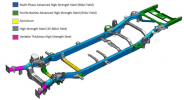HAL9001
Well-Known Member
- Joined
- Nov 10, 2020
- Messages
- 336
- Reaction score
- 673
- Points
- 93
Well, then how are you supposed to get home from the car wash after you rinsed it? And what are you supposed to do after you rinsed off the undercarriage? Put the truck in the garage and not drive it again? The majority of people have to take it back out on the roads soon after it's been washed, and in the salt belt, there's almost always salt on the road until Spring. So, you would need to completely and effectively rinse it off every time you used it, not just weekly, otherwise you're just kidding yourself that it's doing any good.I agree undercoating is the best.
But first off...no one in the right mind would wash their vehicle and then take it for a drive on a snowy/salty road...that would be stupid. But your views don't reflect on what my experience is lol. Don't care if you don't agree ..I pointed out what we did and what worked for us. Kudos. And no...leaving salt on your frame without rinsing it off is what causes the rust. With your mindset washing your truck will cause rust every time which is obviously not the case.
And you're wrong, salt on your frame alone simply cannot effectively cause rust without moisture, that's a fact. Water is what causes rust, not salt. Regular water alone, without any salt, will cause rust all by itself. Salt greatly exacerbates rusting, acting as a catalyst, but without water, salt alone cannot cause rust. Water must be present. Chemistry 101, rust is a form of oxidation, the oxygen comes from the water acting as an electrolyte (H20 or Dihydrogen Monoxide), not from the salt (NaCl or Sodium Chloride).
The chemical formula for rust*:
O2– (aq)+ 2H2O (aq)+ 4e– → 4OH–
The Fe2+ ions then chemically react and bond with the OH– ions in water to create iron hydroxide, which eventually dries up to form rust: (Iron (III) Hydroxide)
Fe2+(aq) + 2OH–(aq) → Fe(OH)2 (aq) → Fe2O3 (s) (rust)
*Sources cited, see links below.
See, no salt (NaCl) in the equation for rust. Salt alone cannot cause rust, it greatly quickens rusting, but it alone cannot cause rust. So, if you leave a vehicle's undercarriage dry or frozen, covered with salt or not, then the rusting process is effectively suspended until unfrozen moisture is once again present to act as the required electrolyte.
You don't need to believe me, look it up for yourself. Here's a start:
https://en.wikipedia.org/wiki/Rust
https://auto.howstuffworks.com/under-the-hood/vehicle-maintenance/prevent-automotive-rust1.htm
https://schoolworkhelper.net/effect-of-sodium-chloride-on-rust-lab-explained/
Look, I'm not telling you or anyone else not to rinse off your undercarriage in the winter if you want. Rather, I'm simply saying it's just not practical for most people in the salt belt as it will soon be covered in salt again, and that continually adding even more water can cause even more rusting because you're constantly adding the most vital substance that causes rusting. Yes, ideally, if you could effectively and continually remove all of the salt all of the time, and then dry the chassis afterward, then the potential for rusting could be significantly reduced, but this is simply not practical in the salt belt. It's a losing battle you cannot win. If you're a daily driver then rinsing once a week is not going to cut it and may actually make it worse by adding even more moisture when the car might have been drier. That's why rustproofing, not constant and futile attempts at rinsing, is the only practical thing a vehicle owner can do in the salt belt in the dead of winter to protect their vehicle.
Last edited:












